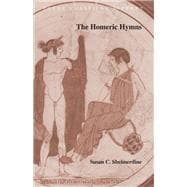
Note: Supplemental materials are not guaranteed with Rental or Used book purchases.
Purchase Benefits
Looking to rent a book? Rent The Homeric Hymns [ISBN: 9781585100194] for the semester, quarter, and short term or search our site for other textbooks by Shelmerdine, Susan C.. Renting a textbook can save you up to 90% from the cost of buying.
The New copy of this book will include any supplemental materials advertised. Please check the title of the book to determine if it should include any access cards, study guides, lab manuals, CDs, etc.
The Used, Rental and eBook copies of this book are not guaranteed to include any supplemental materials. Typically, only the book itself is included. This is true even if the title states it includes any access cards, study guides, lab manuals, CDs, etc.
The Homeric Hymns are a collection of thirty-three poems written in dactylic hexameter, like the Iliad and Odyssey, but composed by different authors over a span of many centuries, from the 8th-century BC to as late as the Hellenistic period. The Hymns fall into two groups: four major poems (to Demeter, Apollo, Hermes and Aphrodite) ranging in length from 293 to 580 lines, and twenty-nine minor poems of 3 to 59 lines. Each of the longer poems tells a story about the god or goddess to whom it is addressed, while the shorter hymns are often only invocations.
Collected in antiquity, the Hymns survive today in thirty-one different manuscripts: 29 late Byzantine manuscripts and 3 fragments of papyrus. How they came to be collected is uncertain, but some manuscripts preserved them along with the Homeric poems, while others grouped them with selections from such authors as Hesiod, Pindar, Orpheus, Proclus, and Callimachus. With the exception of one 15th-century manuscript (M), which preserves the opening of the first Hymn to Dionysos and the entire Hymn to Demeter, all others begin with the Hymn to Apollo.
The Literary Tradition and Its Subject Matter. Although the Hymns were composed at very different times, they all belong to a tradition identified with Homer. A word about this tradition, therefore, and about the stages of Greek literature which immediately followed it may be in order. The earliest surviving works of Greek literature come from the body of hexameter poetry associated with Homer and Hesiod (see chronological table). The individual poems were developed over many generations, as different singers composed and retold favorite stories, and an oral tradition grew up. As a result, it is not possible to say for certain who composed, sang, or even dictated the poems which have survived. If a poet named Homer actually existed, it is not clear what role he played in the development of the poems attributed to him, so modern scholars often speak instead of the tradition in which he, and other poets, worked. The Homeric tradition, which may have originated in Ionia (Map 1), is characterized by the heroic poetry of the Iliad and Odyssey, poems which tell of Achilles’ anger in the war against Troy, and of the return to Greece of resourceful Odysseus after the same war. The Hesiodic tradition, which began on the mainland of Greece in Boiotia (Map 1), preserves didactic and catalogue poetry such as the Works and Days (a poem of advice on how mankind should live in an often harsh world), the Theogony (an account of how the Greek gods came into existence and consolidated their power in the universe), and the Catalogue of Women (a series of short biographies detailing the divine loves and famous offspring of women). Because the origins of this poetry lie in an oral tradition, it is impossible to say with certainty which poem came first, or even, very often, which tradition influenced the other. The Homeric and Hesiodic poems which survive were probably composed in the 8th-century BC. (see Table 1), but not preserved in a fixed, written text until as late as the 6th-century BC when contests involving recitations of heroic poetry became a part of certain festivals in the Greek world.
Also connected with the body of early hexameter poetry are the poems of the so-called Epic Cycle which told a variety of heroic legends from the beginning of the world through the death of Odysseus.